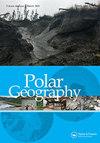Towards improved participatory scenario methodologies in the Arctic
IF 1.6
Q3 GEOGRAPHY, PHYSICAL
引用次数: 27
Abstract
ABSTRACT Participatory scenario methodologies are increasingly used for studying possible future developments in the Arctic. They have the potential to contribute to several high-priority tasks for Arctic research, such as integration of indigenous and local knowledge in futures studies, providing a platform for activating Arctic youth in shaping their futures, identifying Arctic-relevant indicators for sustainable development, and supporting decision-making towards sustainable futures. Yet, to achieve this potential, several methodological challenges need to be addressed. These include attention to whose voices are amplified or silenced in participatory research practices, with special attention to diversification and the engagement of youth. Given the historic and potential future role of disruptive events for Arctic development trajectories, methods are needed in participatory scenario exercises to include attention to the dynamics and consequences of such events and regime shifts. Participatory scenarios can also be further improved through approaches that effectively combine qualitative and quantitative information. Finally, there is a need for systematic studies of how the results of scenario exercises influence decision-making processes. This article elaborates on ways in which attention to these aspects can help make scenarios more robust for assessing a diversity of potential Arctic futures in times of rapid environmental and social change.改进北极参与性情景方法
参与式情景方法越来越多地用于研究北极未来可能的发展。他们有潜力为北极研究的几项高优先级任务做出贡献,例如在未来研究中整合土著和当地知识,为激活北极青年塑造他们的未来提供平台,确定与北极相关的可持续发展指标,并为可持续未来的决策提供支持。然而,要实现这一潜力,需要解决几个方法上的挑战。这包括关注参与性研究实践中哪些人的声音被放大或被压制,特别关注多样化和青年的参与。鉴于破坏性事件对北极发展轨迹的历史和潜在的未来作用,参与性情景演习需要方法,包括对这些事件和政权转移的动态和后果的关注。参与性情景也可以通过有效结合定性和定量信息的方法进一步改进。最后,需要系统地研究情景练习的结果如何影响决策过程。本文详细阐述了在快速的环境和社会变化时期,对这些方面的关注可以帮助制定更可靠的情景,以评估北极潜在未来的多样性。
本文章由计算机程序翻译,如有差异,请以英文原文为准。
求助全文
约1分钟内获得全文
求助全文
来源期刊

Polar Geography
GEOGRAPHY, PHYSICAL-
CiteScore
5.30
自引率
0.00%
发文量
13
期刊介绍:
Polar Geographyis a quarterly publication that offers a venue for scholarly research on the physical and human aspects of the Polar Regions. The journal seeks to address the component interplay of the natural systems, the complex historical, political, economic, cultural, diplomatic, and security issues, and the interchange amongst them. As such, the journal welcomes comparative approaches, critical scholarship, and alternative and disparate perspectives from around the globe. The journal offers scientists a venue for publishing longer papers such as might result from distillation of a thesis, or review papers that place in global context results from coordinated national and international efforts currently underway in both Polar Regions.
 求助内容:
求助内容: 应助结果提醒方式:
应助结果提醒方式:


